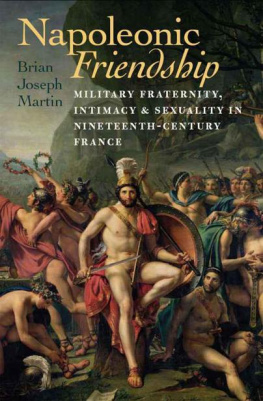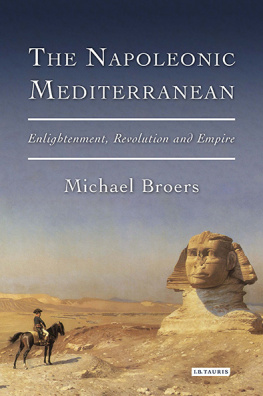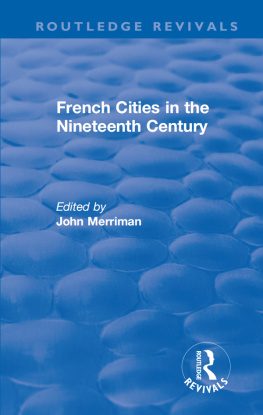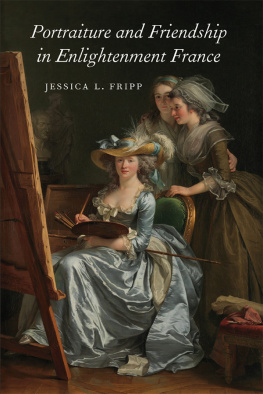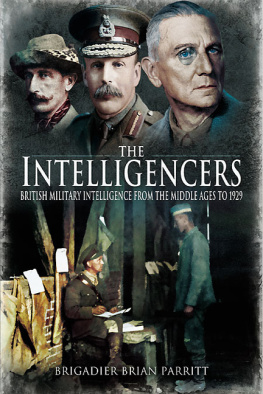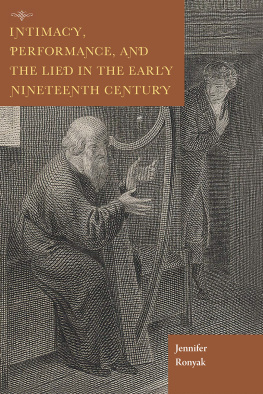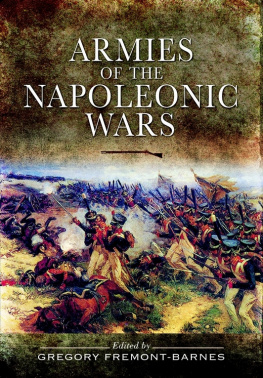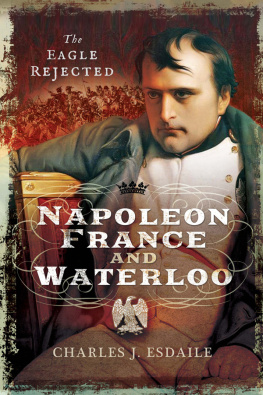BECOMING MODERN
New Nineteenth-Century Studies
SERIES EDITORS
Sarah Way Sherman, Department of English, University of New Hampshire Janet Aikins Yount, Department of English, University of New Hampshire Rohan McWilliam, Anglia Ruskin University, Cambridge, England Janet Polasky, Department of History, University of New Hampshire
This book series maps the complexity of historical change and assesses the formation of ideas, movements, and institutions crucial to our own time by publishing books that examine the emergence of modernity in North America and Europe. Set primarily but not exclusively in the nineteenth century, the series shifts attention from modernitys twentieth-century forms to its earlier moments of uncertain and often disputed construction. Seeking books of interest to scholars on both sides of the Atlantic, it thereby encourages the expansion of nineteenth-century studies and the exploration of more global patterns of development.
For a complete list of books available in this series, see www.upne.com
Brian Joseph Martin, Napoleonic Friendship: Military Fraternity, Intimacy, and Sexuality in Nineteenth-Century France
Andrew Taylor, Thinking America: New England Intellectuals and the Varieties of American Identity
Elizabeth A. Fay, Fashioning Faces: The Portraitive Mode in British Romanticism
Katherine Joslin, Edith Wharton and the Making of Fashion
Daneen Wardrop, Emily Dickinson and the Labor of Clothing
Ronald D. LeBlanc, Slavic Sins of the Flesh: Food, Sex, and Carnal Appetite in Nineteenth-Century Russian Fiction
Barbara Penner, Newlyweds on Tour: Honeymooning in Nineteenth-Century America
Christine Levecq, Slavery and Sentiment: The Politics of Feeling in Black Atlantic Antislavery Writing, 17701850
Jennifer J. Popiel, Rousseaus Daughters: Domesticity, Education, and Autonomy in Modern France
Paula Young Lee, editor, Meat, Modernity, and the Rise of the Slaughterhouse
Duncan Faherty, Remodeling the Nation: The Architecture of American Identity, 17761858
Jennifer Hall-Witt, Fashionable Acts: Opera and Elite Culture in London, 17801880
Scott Molloy, Trolley Wars: Streetcar Workers on the Line
BRIAN JOSEPH MARTIN

Napoleonic
Friendship

MILITARY FRATERNITY,
INTIMACY, AND SEXUALITY
IN NINETEENTH-CENTURY
FRANCE University of New Hampshire Press
Durham, New Hampshire
Published by University Press of New England
Hanover and London
UNIVERSITY OF NEW HAMPSHIRE PRESS
Published by University Press of New England
www.upne.com
2011 University of New Hampshire
All rights reserved
Manufactured in the United States of America
E-Book ISBN 978-1-58465-944-0
For permission to reproduce any of the material in this book, contact Permissions, University Press of New England, One Court Street, Suite 250, Lebanon NH 03766; or visit www.upne.com
Portions of this book have been previously published and are reprinted here by permission of the copyright holders:
Brian Martin, Military Bedfellows and Napoleonic Mentors: Intimacy and Friendship in the Memoirs of Sergeant Bourgogne. Reprinted with permission from Romanic Review 101.2 (May 2010). 2010 Trustees of Columbia University in the City of New York.
Brian Martin, From Balzac to Iraq: Soldiers, Veterans, and Military Adaptation, The Comparatist 30 (May 2006): 6880.
Brian Martin, Corporal Affairs: French Military Fiction from Zola to Proust, in The Future of Beauty in Theatre, Literature, and the Arts, ed. Daniel Meyer-Dinkgrfe (Newcastle, U.K.: Cambridge Scholars Publishing, 2005), 10322. Published with the permission of Cambridge Scholars Publishing.
My heart was as empty as a lover who has lost the object of his passion But now I am like a lover who has rediscovered his desire; I offer my body to support His Majesty. Long live the Emperor!

SOLDIER JEAN BORDENAVE
(1815)
I set out to look for one of my friends, the one with whom I was most intimately linked, the one with whom I had never counted debts; our purses were one and the same.

SERGEANT FRANOIS BOURGOGNE
(1835)
This fraternity of peril had strengthened friendship for some and created new friendships for others. Friendship that forms on the field of battle is one of lasting duration.

CAPTAIN ELZAR BLAZE
(1837)
I loved him, my brave comrade, and would not leave him to the enemy.

CAPTAIN JEAN-ROCH COIGNET
(1851)
CONTENTS
ACKNOWLEDGMENTS
As I complete this book, I am deeply grateful for the sustained support of my benefactors, mentors, colleagues, friends, and family. For the generous fellowships and grants that supported my research and writing in Paris, I am grateful to the Mellon Foundation, the Krupp Foundation, the Hellman Foundation, and the Whiting Foundation, as well as the Humanities Center, the Center for European Studies, and the Department of Romance Languages and Literatures at Harvard University. I am also thankful for the support, during the final stages of this project, of a sabbatical leave and an indexing grant from the Office of the Dean of the Faculty at Williams College.
I want to thank Emily Apter, Alice Jardine, Marjorie Garber, and Tom Conley for their many years of mentorship, inspiration, and guidance, and for their confidence in this project from its earliest stages. I am indebted to Melanie Hawthorne, David Powell, and Margaret Waller for their detailed reading of the manuscript and their invaluable suggestions, which have helped to make this a much better book. I sincerely thank Allan Brub and Jean Tulard for their inspiration, correspondence, and encouragement. For their wise counsel, sustained confidence, and generous advice on this project, I want to express my gratitude to my colleagues in the Department of Romance Languages at Williams College: Kashia Pieprzak, Glyn Norton, Jennifer French, Gene Bell-Villada, Leyla Rouhi, Soledad Fox, and Richard Stamelman. For their expertise, encouragement, and friendship during the revisions of the manuscript, I am grateful to several other colleagues at Williams, including Chris Waters, Carol Ockman, Gretchen Long, Denise Buell, Alexandra Garbarini, Regina Kunzel, Katie Kent, Christine Mnard, Steve Fix, Bill Lenhart, and Bill Wagner. Thanks also go to a number of colleagues beyond my home campus who offered helpful advice and feedback, including Jarrod Hayes, Daniel Meyer-Dinkgrfe, George Moskos, Philippe Dubois, and Vinay Swamy.
I want also to thank Elisabeth Ladenson, General Editor of the Romanic Review, Dorothy Figueira, Editor of The Comparatist, and Chris Humphrey and the editors of Cambridge Scholars Publishing for their permission to reprint portions of this text that were published in earlier versions as: Military Bedfellows and Napoleonic Mentors: Intimacy and Friendship in the Memoirs of Sergeant Bourgogne, Romanic Review 101.2 (May 2010); From Balzac to Iraq: Soldiers, Veterans, and Military Adaptation, The Comparatist 30 (May 2006): 6880; Corporal Affairs: French Military Fiction from Zola to Proust, The Future of Beauty in Theatre, Literature, and the Arts, ed. Daniel Meyer-Dinkgrfe (Newcastle: Cambridge Scholars Publishing, 2005) 10322.

